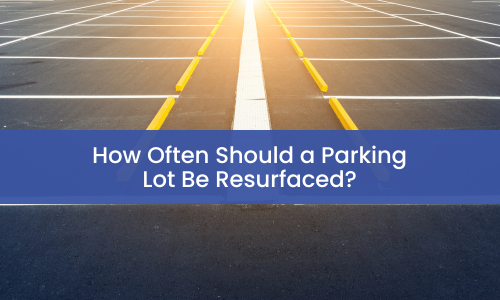There is no set timeline for parking lot resurfacing, as there are several factors to consider, including:
- The parking lot’s condition
- The parking lot’s age
- Whether the parking lot is constructed from concrete or asphalt
- The amount of traffic the parking lot typically receives
In general, commercial parking lots perform best when they are resurfaced every 5-10 years. An experienced Houston pavement contractor can provide an exact estimate for your parking lot and determine whether it is time to consider resurfacing.
When it is Time to Resurface a Parking Lot
Resurfacing a parking lot will add to its lifespan, improve its driving performance and improve its appearance, so there are good reasons to resurface a parking lot on time. The question is when is it time to make the investment? Here are the important things to consider that will help answer that question:
- The parking lot’s condition – This is the most pressing factor when reviewing your pavement maintenance options.
Resurfacing a parking lot is cost efficient when the pavement has developed some minor, surface-level flaws, but is still in good shape overall. Resurfacing is ideal for small, non-working cracks, small spalls, discoloration and minor instances of warping. Resurfacing is not a good option for pavement that has deeper issues, like an unstable base. Deeper problems will be “reflected” before long on the new surface, with cracks and defects appearing in the same areas as previous damage. - The parking lot’s age – Age is another critical factor. If your pavement is nearing the end of its useful life (15-20 years for asphalt, 25+ years for concrete), it will likely be more cost effective to replace the parking lot down to its full depth. If the parking lot is under 10 years old, resurfacing will provide a better return on investment.
- The parking lot’s material – Asphalt is generally easier and less expensive to resurface than concrete. Asphalt parking lots are resurfaced during a process termed “overlaying.” When asphalt is overlaid, the top couple inches of pavement are milled down and removed (or used to produce a new hot mix of asphalt). Any issues with the parking lot’s base are corrected and a new surface course of asphalt is installed.
Concrete can either be resurfaced with a special mix of concrete or overlaid with a layer of asphalt. Resurfacing concrete is extremely tricky, as the material’s rigidity increases the risk of cracks and other flaws forming. - How much traffic the parking lot receives – Commercial parking lots that have frequent heavy traffic may be better off with deeper, longer lasting repairs, as resurfaced concrete is not as durable as pavement that has been repaired down to its base. However, if your parking lot is not heavily used, resurfacing is a relatively inexpensive way to improve its condition and long-term performance.
Resurfacing or an Asphalt Overlay: Which Surface Treatment to Choose for Your Parking Lot
Given all the factors to consider when repairing a parking lot, it is important to work with a reputable paving contractor that can inspect the parking lot and provide recommendations for maintenance or repairs on a case-by-case basis. This is especially important when maintaining concrete.
If your concrete parking lot needs significant surface-level maintenance, here is what the contractor will consider when determining whether resurfacing and overlaying is the best option:
- Is any damage threatening the parking lot’s structural integrity?
Resurfacing concrete does not restore its load-bearing strength. Full-depth repairs are necessary for that. Resurfacing is generally used for surface-level cosmetic issues.
- Is this the first time the concrete has been repaired for this issue?
If the same cracks, spalls and other surface flaws show up repeatedly after repairs, there are more serious pavement problems that must be addressed. This will require full-depth repairs.
- Is the parking lot’s damage widespread?
Generally, pavement contractors will recommend extensive, deeper repairs if more than 20 percent of the parking lot is damaged. This typically indicates issues that can only be corrected by removing the failed pavement and replacing it with fresh concrete or asphalt.
- Do you suspect installation or work quality issues?
Unfortunately, there are a significant number of concrete teams that provide shoddy work and disappear before their unprofessionalism is discovered. If your parking lot is failing far sooner than it should, poor workmanship may be the culprit. Only full replacement can guarantee that you will get a reliably performing parking lot.
A Reputable Houston Paving Company Can Provide Resurfacing or Repair Services for Your Parking Lot
If your parking lot needs a curb appeal boost, or if it is developing worrying signs of damage, surface treatment may be in order. Resurfacing, overlaying and other forms of surface maintenance can add to your parking lot’s long-term viability and its value – but only if the right repair option is chosen.
An experienced pavement team can help property owners make this determination for their parking lot and ensure their clients get an effective long-term repair.
- HOA & Condos – How Asphalt Pavement Can Affect Your Houston Property Values - March 6, 2025
- What Certifications or Licenses Should a Houston Asphalt Contractor Have? - September 17, 2024
- Common Challenges in Concrete Construction - September 11, 2024

